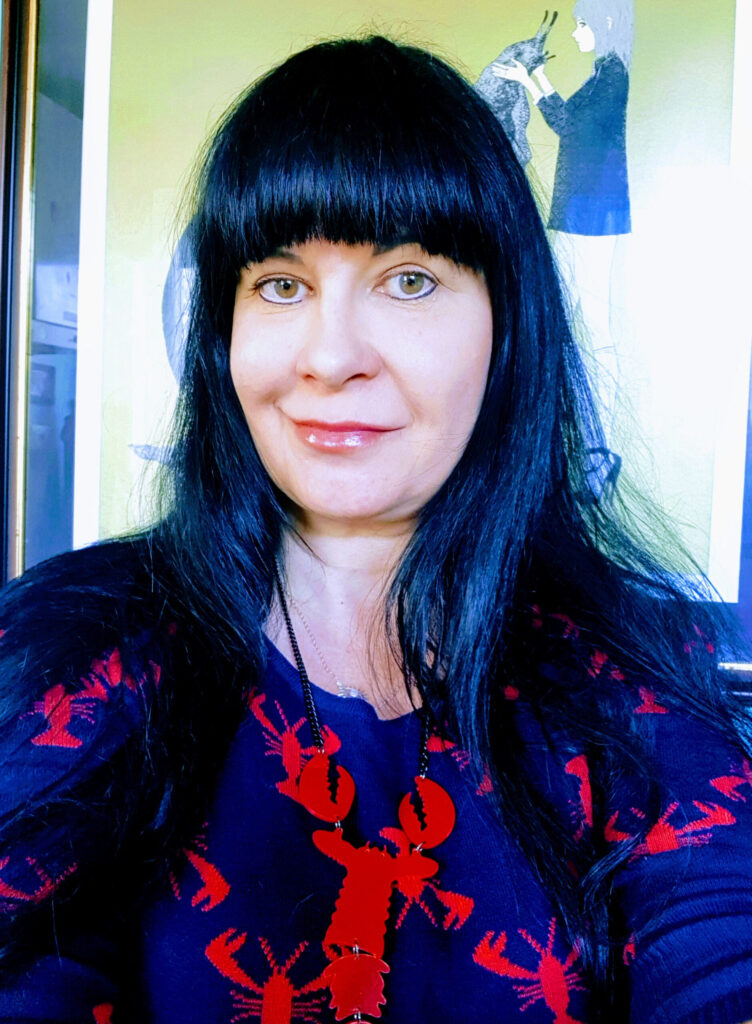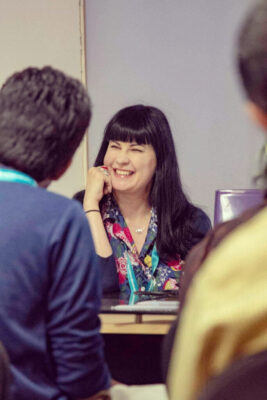By Sarah Prause
I recently had the fortune of interviewing film preservationist Kasandra “Kaz” O’Connell. Kaz is the head of the Irish Film Institute’s (IFI) Irish Film Archive, a role she has held for over 20 years. Being involved in film preservation was not a dream she’d fostered from her youth, but a love she found along the way. In college, Kaz studied fashion with a goal of working in design. After graduation she realized she wouldn’t enjoy a career in that field, so she decided to go back to school for a certificate in media studies. What started as a six-week internship for the costume department of the National Museum turned into a five-year position. It was during this time that she learned about curation and collection management, which prompted her to pursue a master’s degree in museum studies and archiving. She was aware of the IFI through a former colleague and focused on their work for a final project. When she saw an opening for their head of archive position, she never dreamed she would get it, but she applied anyway and has been in the role ever since. During our conversation, topics ranged from discussing the IFI’s Irish Film Archive, concerns for the future of film preservation, accessibility of archives, and her thoughts on the next generation of film preservationists.

To adequately understand the challenges facing Kaz as the head of the IFI’s Irish Film Archive, it is critical to know the unique history of the organization. The IFI traces its beginnings to the 1943 founding of Ireland’s National Film Institute (NFI). This organization was created with a strong Catholic mission to promote the “education and moral guardianship” of Ireland. The reasoning for Catholic Church involvement in film stemmed from a 1936 statement by Pope Pius XI, known as Vigilanti Cura, which detailed church fears of moral degradation within society by popular moving images and arguing for church intervention as a counter. Religious involvement continued in preservation, education, and production decisions until 1982 when a secular board decided to separate the organization from Catholic influences and renamed the NFI to the IFI. An organized archival unit, that today consists of about 30,000 cans of film dating as far back as 1897, did not start to appear until the transition to the IFI. Recent increases in digitization and digital material intake has pivoted Kaz and the IFI to quickly adapt to technological challenges. Significant work in open source script development and implementation of digital preservation strategies has been world class, netting IFI’s Loopline Project the 2018 award for Safeguarding Digital Legacy from the Digital Preservation Coalition and the 2019 Joint Technical Symposium Award from the Co-ordinating Council of Audiovisual Archives Associations. The scripts are all available through GitHub for interested archivists. Even through the IFI’s major changes, it still emphasizes a mission of, “education through and about film…”.1
In her role as head of archive Kaz is on the frontline of preserving Ireland’s film heritage. The country lacks a government funded central film archive, unlike other Western countries, and Kaz’s mission is for the archive to fill that role. Difficulty is increased due to the IFI not being funded primarily through the state;2 thus Kaz spends significant time securing the financial resources to care for and expand the collection. Kaz sees her role as twofold. First, to ensure the safety and proper preservation of the collection by securing funding and planning projects and programs for the archive’s stakeholders. Second, to advocate for film preservation on a national and international scale. Within the wider field of archives, Kaz is a member of the prominent film preservation organizations: the International Federation of Film Archives (FIAF) and the Association of Moving Image Archivists (AMIA). Both organizations support moving image archivists with training opportunities, highlight issues facing the industry, and promote moving image archives throughout the world and Kaz has regularly helped to deliver training programs for FIAF and is on the editorial board of AMIA’s journal The Moving Image. Kaz also recently decided to pursue a PhD at Dublin City University, with a focus on analyzing the history of film preservation in Ireland. As with everything she does, her goal is to bring an Irish perspective to the conversation and highlight her country’s cultural heritage.

Part of any head archivist’s job is to bring new items to the collection. Kaz and the IFI noticed that large gaps of time were not represented in their archives. To remedy this, they held a national callout, hoping to bring in collections in the hands of citizens. Most items they received were amateur and home films, an area of emphasis in their archival collections, as Kaz explained, “As there was so little professional production in Ireland, these collections give us an amazing insight into the lives of Irish people and the things that they felt were important enough to record.”
When I asked Kaz what challenges she saw facing the future of archiving, she provided a distinct perspective. One of her concerns is the potential environmental impact of contemporary film preservation. In her words, “We are at a bit of a crossroads in terms of aligning the environmental impact of the large amounts of digital content we take in or create and the sustainability and longevity of our profession.” In working to digitize and preserve in the highest possible quality, Kaz explained, archives are negatively impacting the environment and the eco-sustainability of archival processes is something she is concerned about. As a solution she referenced an unorthodox approach that is currently being implemented within some archival circles: preserving born digital content on film for long term preservation.
When stored properly, film can survive for hundreds of years. While archives are embracing digital materials, they contain serious drawbacks for preservation. Digital materials are fragile, with file types becoming obsolete at rapid speeds. Digitization is a great tool for preservation and making films accessible, but at the cost of a burdensome workload and financial strain. Though it seems straightforward, the process often requires third-party vendors and a highly trained staff. Beyond the expense of digitizing films, the cost and energy usage of the infrastructure required to store the files is massive and unobtainable for smaller institutions. By preserving born-digital materials in physical formats, archivists can ensure their preservation in perpetuity and protect them from equipment obsolescence and failure.
Accessibility is an important topic in archives because it determines how people can find and use the items that archivists are preserving. Every archive has their own approach to making their collections accessible. Kaz and the IFI Irish Film Archive developed the IFI Archive Player to provide free access to their digitized materials to anyone in the world. They also supply closed captioning for digitized objects and select screenings, increasing accessibility for the hearing impaired. Kaz noted that screenings are a great way to get people interested in archives. In 2021, the IFIArchive and their sister department, Irish Film Programming, hosted “561 screenings of 220 Irish films, to audiences of 28,993, at 55 events in 55 cities across 33 countries.”
Another concept currently being debated by audiovisual archives is ‘thoughtful loss.’ Archives are recognizing that they don’t have the resources to keep as much material as they instinctively wish to and are reverting to a more rigorous appraisal of collections (and are increasingly selective about what they decide to preserve). This approach was once the foundation of archival science but in the digital era it has become less popular, as the storage of large quantities of data becomes realistic. A recognition of the long-term impact of ‘keeping everything’ has led to archivists revisiting this tenet of the profession.
Finally, I asked Kaz if she had any fears about getting younger generations involved in film preservation while the world around us relies more on technology. In her eyes, the problem is not that people are uninterested in the field, but that there are few programs for learning the skills and limited employment opportunities. Getting people interested in film preservation can only go so far if the training is not available. In America, there are a handful of renowned film preservation programs, but that is not the case in Europe. Kaz noted that there is one course in the Netherlands that teaches the subject, but few Irish people attend. She has worked with several universities in Ireland and hopes that that work can draw newcomers to the field.
It was a pleasure having this conversation with Kaz, and I wish her and the IFI continued success. For more information on her projects and programming, or to view IFI materials, please visit the IFI website. To keep up with the latest from Kaz, follow her on Twitter.
1. Kasandra O’Connell, “Moving History – An Introduction to the IFI Irish Film Archive,” 2018, Irish Family History Centre, streaming, 25:12, https://soundcloud.com/eneclann/kasandra-oconnell.
2. Ibid.
Leave a Reply